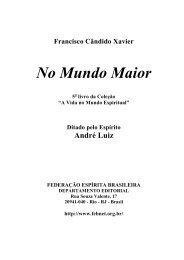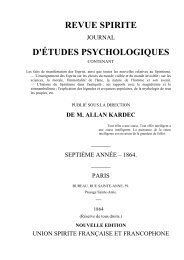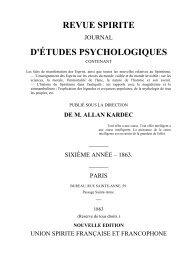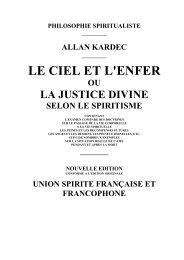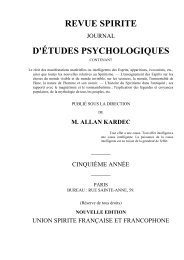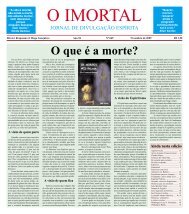PDF version - Geae
PDF version - Geae
PDF version - Geae
You also want an ePaper? Increase the reach of your titles
YUMPU automatically turns print PDFs into web optimized ePapers that Google loves.
We remind the above author that the men he speaks of simply represented the roles of intermediaries,<br />
limiting themselves to coordinating and publishing the teachings received through mediumship.<br />
On the other hand, we should notice that there will always be indifferent, agnostic and tardy spirits<br />
ready to think we advance too fast. There would not be any possible progress, if we had to wait for latecomers.<br />
It is truly amusing to see people - whose interest for this subject dates back only to yesterday - trying to offer<br />
guidelines to men of the likes of Allan Kardec who dared to publish his works only after years of laborious<br />
investigations and mature reflections, hence complying with formal orders and drinking from fountains of<br />
information that our excellent critics can hardly imagine.<br />
All those who devotedly follow the development of psychic studies, can verify that the results<br />
acquired from such a work came to confirm and to further strengthen all the points of Kardec’s work.<br />
Charles Richet tells us that the eminent professor at Cambridge, Frederich Myers (who was for twenty<br />
years the soul of the “Society for Psychical Researches,” of London, and who was subsequently promoted in<br />
1900 to honorary president of the official International Congress of Psychology of Paris) makes the following<br />
declaration in the last pages of his magisterial work, La Personnalité Humaine, sa Survivance - a publication<br />
that produced a profound sensation in the intellectual world: “For all enlightened and conscious researcher<br />
these inquiries will provide place, logic, and obviously a vast philosophic and religious synthesis.” Focusing<br />
on this information, he devotes the tenth chapter of that work to a “generalization or conclusion that<br />
establishes a more obvious connection between these new discoveries and the scheme of thoughts and beliefs<br />
already existent of the civilized man.” 16<br />
The exposition of his work ends as follows:<br />
“Bacon had predicted the progressive victory of observation and experience in all fields of<br />
human studies; in all except one: the control over “divine things.” I am determined to show that this great<br />
exception is not justified. I insist there is a method to obtain the knowledge of divine things with the same<br />
certainty and safety with which we have reached the progress that we possess in the knowledge of terrestrial<br />
things. The authority of the church will, therefore, be substituted by that of observation and experience. The<br />
impulses of faith will be transformed into rational and firm convictions, giving rise to a superior ideal well<br />
above all that Humanity has known thus far.”<br />
Consequently, what some critics of little sagacity consider as a premature endeavor appears to F.<br />
Myers as “a necessary and unavoidable evolution.” The philosophical synopsis that concludes his work<br />
received the highest support in scientific circles. Sir. Oliver Lodge, the English academic declares: “it<br />
constitutes one of the most extensive, comprehensible and well founded proposals concerning existence, that<br />
has been seen.” 17<br />
Prof. Flournoy of Geneva gives it his highest praise in his “Archives of Psychologie de la Suisse<br />
Romande” (June 1903).<br />
In France, other men of the scientific field, though unrelated with Spiritism, comes to similar<br />
conclusions.<br />
Mr. Maxwell, a medical doctor and the substitute Attorney General at the Court of Appeals of Paris<br />
verbalized it as follows 18 :<br />
“Spiritism arrives at its own time and corresponds to a general need… The expansion this doctrine is<br />
taking is one of the most curious phenomena of the current epoch. We watch what seems to me to be the birth<br />
of a true religion, without ritual ceremonies and without the clergy, but with assemblies and practices.<br />
Regarding myself, I find extreme interest in these meetings and have the impression of observing the birth of a<br />
religious movement predestined to a great future.”<br />
In view of these appreciations, our challengers’ arguments and recriminations come to a halt. What,<br />
then, should we attribute their a<strong>version</strong> to the Spiritist Doctrine? Could it be due to the fact that the spiritist<br />
teachings – with its laws of responsibilities, its linkage of cause and effect developed in the moral dominium,<br />
and its sanctioning through the examples they bring to us – cause a terrible embarrassment for a great number<br />
of people who pays little importance to philosophy?<br />
16 F. Myers – La Personnalité Humaine, sa Survivance, ses Manifestations Supranormales, Felix Alcan, edition of 1905, pgs. 401 to 403.<br />
17<br />
Myers’ synopsis can be abridged as follows: Gradual and Infinite Evolution, with multiple stages, of the human soul in wisdom and love. The<br />
human soul extracts its strength and grace from a spiritual universe. That universe is animated and governed by the Divine Spirit, is accessible to the<br />
soul and is in communication with it.<br />
18 J. Maxwell – Les Phénomènes Psychiques, Alcan, ed., 1903, pgs. 8 & 11.<br />
27



